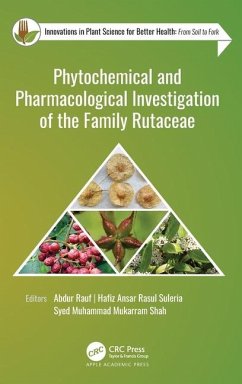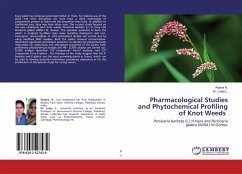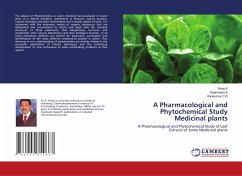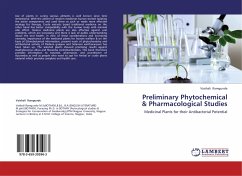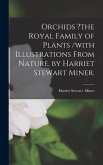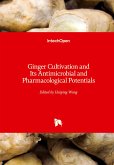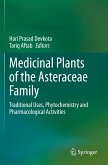Phytochemical and Pharmacological Investigation of the Family Rutaceae
Herausgeber: Rauf, Abdur; Mukarram Shah, Syed Muhammad; Rasul Suleria, Hafiz Ansar
Phytochemical and Pharmacological Investigation of the Family Rutaceae
Herausgeber: Rauf, Abdur; Mukarram Shah, Syed Muhammad; Rasul Suleria, Hafiz Ansar
- Gebundenes Buch
- Merkliste
- Auf die Merkliste
- Bewerten Bewerten
- Teilen
- Produkt teilen
- Produkterinnerung
- Produkterinnerung
Provides an introduction to the family Rutaceae and delineates its phytochemical and pharmacological properties and uses. Also addressed are the nutritional, clinical, and toxicological profiles, elaborating on the nutritional value of Rutaceae plants, their healthcare and clinical applications, and their possible toxic side effects.
Andere Kunden interessierten sich auch für
![Pharmacological Studies and Phytochemical Profiling of Knot Weeds Pharmacological Studies and Phytochemical Profiling of Knot Weeds]() Anjana N.Pharmacological Studies and Phytochemical Profiling of Knot Weeds40,99 €
Anjana N.Pharmacological Studies and Phytochemical Profiling of Knot Weeds40,99 €![A Pharmacological and Phytochemical Study Medicinal plants A Pharmacological and Phytochemical Study Medicinal plants]() Vinay K.A Pharmacological and Phytochemical Study Medicinal plants28,99 €
Vinay K.A Pharmacological and Phytochemical Study Medicinal plants28,99 €![Preliminary Phytochemical & Pharmacological Studies Preliminary Phytochemical & Pharmacological Studies]() Vaishali RamgundePreliminary Phytochemical & Pharmacological Studies36,99 €
Vaishali RamgundePreliminary Phytochemical & Pharmacological Studies36,99 €![Orchids ?the Royal Family of Plants /with Illustrations From Nature, by Harriet Stewart Miner. Orchids ?the Royal Family of Plants /with Illustrations From Nature, by Harriet Stewart Miner.]() Harriet Stewart MinerOrchids ?the Royal Family of Plants /with Illustrations From Nature, by Harriet Stewart Miner.34,99 €
Harriet Stewart MinerOrchids ?the Royal Family of Plants /with Illustrations From Nature, by Harriet Stewart Miner.34,99 €![Biological Investigation. The Variability of Organisms Biological Investigation. The Variability of Organisms]() Felix DyrekBiological Investigation. The Variability of Organisms9,99 €
Felix DyrekBiological Investigation. The Variability of Organisms9,99 €![Ginger Cultivation and Its Antimicrobial and Pharmacological Potentials Ginger Cultivation and Its Antimicrobial and Pharmacological Potentials]() Ginger Cultivation and Its Antimicrobial and Pharmacological Potentials89,99 €
Ginger Cultivation and Its Antimicrobial and Pharmacological Potentials89,99 €![Medicinal Plants of the Asteraceae Family Medicinal Plants of the Asteraceae Family]() Medicinal Plants of the Asteraceae Family171,99 €
Medicinal Plants of the Asteraceae Family171,99 €-
-
-
Provides an introduction to the family Rutaceae and delineates its phytochemical and pharmacological properties and uses. Also addressed are the nutritional, clinical, and toxicological profiles, elaborating on the nutritional value of Rutaceae plants, their healthcare and clinical applications, and their possible toxic side effects.
Hinweis: Dieser Artikel kann nur an eine deutsche Lieferadresse ausgeliefert werden.
Hinweis: Dieser Artikel kann nur an eine deutsche Lieferadresse ausgeliefert werden.
Produktdetails
- Produktdetails
- Verlag: Apple Academic Press
- Seitenzahl: 244
- Erscheinungstermin: 5. Juli 2024
- Englisch
- Abmessung: 240mm x 161mm x 18mm
- Gewicht: 534g
- ISBN-13: 9781774913710
- ISBN-10: 1774913712
- Artikelnr.: 70161374
- Herstellerkennzeichnung
- Libri GmbH
- Europaallee 1
- 36244 Bad Hersfeld
- gpsr@libri.de
- Verlag: Apple Academic Press
- Seitenzahl: 244
- Erscheinungstermin: 5. Juli 2024
- Englisch
- Abmessung: 240mm x 161mm x 18mm
- Gewicht: 534g
- ISBN-13: 9781774913710
- ISBN-10: 1774913712
- Artikelnr.: 70161374
- Herstellerkennzeichnung
- Libri GmbH
- Europaallee 1
- 36244 Bad Hersfeld
- gpsr@libri.de
Abdur Rauf, PhD, is Assistant Professor, Department of Chemistry, University of Swabi, Anbar, Khyber Pakhtunkhwa, Pakistan. His research work focuses on phytochemistry and pharmacology, dealing particularly with bio-guided isolation of new compounds for drug discovery. His research interests include isolation and structure elucidation of bioactive compounds using several innovative techniques followed by in vitro and in vivo biological screening. Dr. Rauf is the author and coauthor of more than 280 research papers published in peer-reviewed journals, with 5392 citations as reported by Google Scholar. He has also written 10 book chapters in international books and holds two national and two international patents for discovery of novel antidiabetic drugs. Furthermore, e is an associate editor/editorial board member of Frontier in Pharmacology, Biocell, Green Processing and Synthesis, and Medicinal Chemistry, among others. He is also a fellow of the American Chemical Society and of the Laboratory of Biological Control and Antimicrobial Resistance of Orel State University, Russia. He has supervised two PhD and four MPhil students. Dr. Rauf has won a Young Scientist Award from the Directorate of Science and Technology, KP, Pakistan (2018), and the Research Productivity Award (2016-17) from the Pakistan Science Foundation. He has also won eight national and four international projects. The major goals of Dr. Rauf's research include the discovery of eco-friendly and cost-effective protocols for the production of nanoparticles-based new drugs with bio-medicinal interest. He completed his PhD at the Institute of Chemical Sciences, University of Peshawar, Pakistan, in 2015. Hafiz Ansar Rasul Suleria, PhD, is in the School of Agriculture and Food, Faculty of Veterinary and Agricultural Sciences, The University of Melbourne, Parkville, Victoria, Australia. He was formerly the Alfred Deakin Research Fellow at Deakin University, Victoria, Australia. He did his postdoctoral fellowship at the Department of Food, Nutrition, Dietetic and Health at Kansas State University, USA. He is also an Honorary Fellow of the Diamantina Institute, Faculty of Medicine, The University of Queensland (UQ), Australia. Dr. Suleria has been awarded an International Postgraduate Research Scholarship and the Australian Postgraduate Award for his PhD research at the UQ School of Medicine and the Translational Research Institute in collaboration with the Commonwealth and Scientific and Industrial Research Organization, Australia. Before joining the UQ, he worked as a lecturer in the Department of Food Sciences, Government College University Faisalabad, Pakistan. He also worked as a research associate in the PAK-US Joint Project funded by the Higher Education Commission, Pakistan, and Department of State, USA, with collaboration of the University of Massachusetts, USA, and the National Institute of Food Science and Technology, University of Agriculture Faisalabad, Pakistan. Dr. Suleria has published more than 80 peer-reviewed scientific papers in professional journals and has co-edited several books. He is also in collaboration with more than ten universities where he is working as a co-supervisor/special member for PhD and postgraduate students. His major research focus is on food nutrition, particularly in screening of bioactive molecules, including isolation, purification, and characterization using various cutting-edge techniques from different plants, marine, and animal sources; in vitro, in vivo bioactivities; and cell culture and animal modeling. Syed Muhammad Mukarram Shah, PhD, is currently working as Professor in the Department of Pharmacy, University of Swabi, Khyber Pakhtunkhwa, Pakistan. Dr. Shah has published more than 40 research papers in international journals. His research work is on pharmacology, phytochemicals, and pharmacology, dealing particularly with bio-guided isolation of active compounds for drug discovery. His research interests include isolation and structure elucidation of bioactive compounds using several innovative techniques followed by in vitro and in vivo biological screening. His research work also explores novel plant-based remedies for the treatment of inflammation, analgesia neuroinflammation, Alzheimer's disease, and depression.
PART I: INTRODUCTION AND USAGE OF THE FAMILY RUTACEAE 1. Family Rutaceae:
An Introduction 2. Family Rutaceae: An Overview of Its Traditional Uses 3.
Ethno-Medicinal Applications of the Family Rutaceae PART II: PHYTOCHEMICAL
AND PHARMACOLOGICAL STUDIES OF FAMILY RUTACEAE 4. Phytochemistry and
Medicinal Uses of the Family Rutaceae 5. Essential Oils from the Family
Rutaceae 6. The Family Rutaceae: A Comprehensive Review on Its
Phytochemical and Pharmacological Perspectives 7. Biological Importance of
Essential Oils from the Family Rutaceae PART III: NUTRITIONAL CLINICAL, AND
TOXICOLOGICAL PROFILE OF THE FAMILY RUTACEAE 8. Nutritional Use of the
Family Rutaceae 9. Rutaceae: An Insight into Healthcare and Clinical
Applications 10. Toxicological Profile of the Rutaceae Family 11.
Antioxidant Properties of family Rutaceae
An Introduction 2. Family Rutaceae: An Overview of Its Traditional Uses 3.
Ethno-Medicinal Applications of the Family Rutaceae PART II: PHYTOCHEMICAL
AND PHARMACOLOGICAL STUDIES OF FAMILY RUTACEAE 4. Phytochemistry and
Medicinal Uses of the Family Rutaceae 5. Essential Oils from the Family
Rutaceae 6. The Family Rutaceae: A Comprehensive Review on Its
Phytochemical and Pharmacological Perspectives 7. Biological Importance of
Essential Oils from the Family Rutaceae PART III: NUTRITIONAL CLINICAL, AND
TOXICOLOGICAL PROFILE OF THE FAMILY RUTACEAE 8. Nutritional Use of the
Family Rutaceae 9. Rutaceae: An Insight into Healthcare and Clinical
Applications 10. Toxicological Profile of the Rutaceae Family 11.
Antioxidant Properties of family Rutaceae
PART I: INTRODUCTION AND USAGE OF THE FAMILY RUTACEAE 1. Family Rutaceae:
An Introduction 2. Family Rutaceae: An Overview of Its Traditional Uses 3.
Ethno-Medicinal Applications of the Family Rutaceae PART II: PHYTOCHEMICAL
AND PHARMACOLOGICAL STUDIES OF FAMILY RUTACEAE 4. Phytochemistry and
Medicinal Uses of the Family Rutaceae 5. Essential Oils from the Family
Rutaceae 6. The Family Rutaceae: A Comprehensive Review on Its
Phytochemical and Pharmacological Perspectives 7. Biological Importance of
Essential Oils from the Family Rutaceae PART III: NUTRITIONAL CLINICAL, AND
TOXICOLOGICAL PROFILE OF THE FAMILY RUTACEAE 8. Nutritional Use of the
Family Rutaceae 9. Rutaceae: An Insight into Healthcare and Clinical
Applications 10. Toxicological Profile of the Rutaceae Family 11.
Antioxidant Properties of family Rutaceae
An Introduction 2. Family Rutaceae: An Overview of Its Traditional Uses 3.
Ethno-Medicinal Applications of the Family Rutaceae PART II: PHYTOCHEMICAL
AND PHARMACOLOGICAL STUDIES OF FAMILY RUTACEAE 4. Phytochemistry and
Medicinal Uses of the Family Rutaceae 5. Essential Oils from the Family
Rutaceae 6. The Family Rutaceae: A Comprehensive Review on Its
Phytochemical and Pharmacological Perspectives 7. Biological Importance of
Essential Oils from the Family Rutaceae PART III: NUTRITIONAL CLINICAL, AND
TOXICOLOGICAL PROFILE OF THE FAMILY RUTACEAE 8. Nutritional Use of the
Family Rutaceae 9. Rutaceae: An Insight into Healthcare and Clinical
Applications 10. Toxicological Profile of the Rutaceae Family 11.
Antioxidant Properties of family Rutaceae

